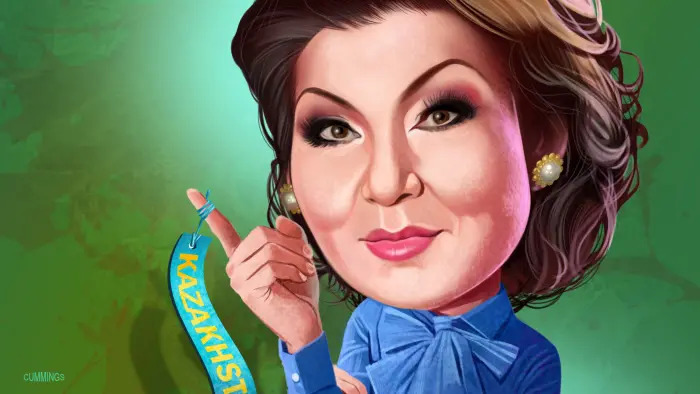
The Moscow-educated opera singer is primed to be the country’s first female leader
This week, his prophecy began to take shape. Mr Nazarbayev, 78, unexpectedly announced he would resign from office after almost three decades in charge, and appointed his eldest daughter Dariga Nazarbayeva as Speaker of the country’s Senate, a role that occupies second place in the line of succession.
“Let me thank you again for your trust and assure you that I will apply all my knowledge and experience to achieve the goals and objectives set,” Ms Nazarbayeva said on Wednesday. Should acting president Kassym-Zhomart Tokayev die in office or resign, Ms Nazarbayeva would succeed him as the country’s first female president. Or she may win power at a presidential election scheduled for next year.
Investors and analysts have been wondering for years how the former Soviet leader — to date the only president of independent Kazakhstan — would hand over power in a region dominated by longstanding strongmen.
“Blood ties are of great significance for the traditional state,” explains Stanislav Pritchin, an analyst.
Moscow-educated and fluent in English, Italian and German, Ms Nazarbayeva, 55, has held a number of high but non-administrative roles in recent years, from senator to deputy prime minister and leader of the ruling Nur Otan party’s parliamentary faction.
Now she has an another role to play.
According to George Voloshin, Kazakh-born and Paris-based geopolitical analyst at Aperio, Ms Nazarbayeva’s “backstop function” is to make sure that, if something happens to Mr Tokayev before he is replaced, power stays within the family or close circle. The succession would then be determined by electing “a new younger president, to be mentored by Nazarbayev while he is still alive, as planned”.
More famous in Kazakhstan for her opera singing, little is known about Ms Nazarbayeva’s political outlook or how it may differ from her father’s. A mezzo-soprano who took to her passion late in life, she has regularly performed in domestic concerts and also at the Bolshoi Theatre in Moscow in 2011.
Asked about her qualities as a politician, Moscow-based political scientist Arkady Dubnov replied: “She sings well, her arias are good.” And, he added: “When she was deputy prime minister, on social issues, there were lots of promises, of talking and PR. But no one recalls anything of what she has managed to do . . . This is a person who was placed in various high-level jobs by her dad to create a rich service record. Everyone understands that.”
Ms Nazarbayeva is seen as having a more international approach, which could help reshape the future of this major oil producing country, in recent years pulled between China, Europe, the US and its traditional ally Russia.
“She is a great combination of being part of the family and having a western approach,” said a foreign businessman who has worked with both Nazarbayevs. “They wanted to promote the idea of privatisation with western companies, to bring knowhow.” He applauded her moves to “open up the economy in a more transparent way to international investors”.
A mother of three, Ms Nazarbayeva has not had an altogether smooth ride, despite her position. In 2007, her husband Rakhat Aliyev was convicted of criminal charges. Stripped of his official positions, he fled to Austria. After a divorce from Ms Nazarbayeva, he was found hanged in a Vienna jail cell in 2015. Austrian authorities said it was suicide.
Her clout has risen with her current husband, Kayrat Sharibayev, head of state gas transportation company Kaztransgas. In the clan-based world of Kazakh politics, his influential lineage gives the couple increased leverage.
Ms Nazarbayeva was named in documents leaked as part of the Panama Papers as the owner of an offshore company in the British Virgin Islands that ultimately owned shares in Kazakh sugar factories. Forbes magazine last assessed her wealth at $595m in 2013.
Some analysts are not convinced that she will make it all the way to the top. “First, she is a woman and Kazakhstan is a patriarchal state,” Mr Pritchin said, arguing the elite would see a female president as “provocative” and “not acceptable”.
Her father’s support gives her a huge advantage in the essentially one-party state, but there are other sources of power in the country. “It is unclear whether she will be able to muster the support of various Kazakh clans and interest groups after her father’s death,” Mr Voloshin said.
Ms Nazarbayeva has strong rivals for the presidency, including Karim Massimov, a former prime minister and head of the Kazakh security services. Then there is Ms Nazarbayeva’s brother-in-law. Timur Kulibayev, an oil and gas tycoon married to her younger sister Dinara, has long been seen as a potential heir. As a couple they are ranked as the country’s second-richest people. But with Ms Nazarbayeva now in pole position, they are most likely to be the ones having to consider defeat, Mr Dubnov said. “You think it will be sister-like there? More likely Shakespearean.”
Original source of article:
Authors: Nastassia Astrasheuskaya




